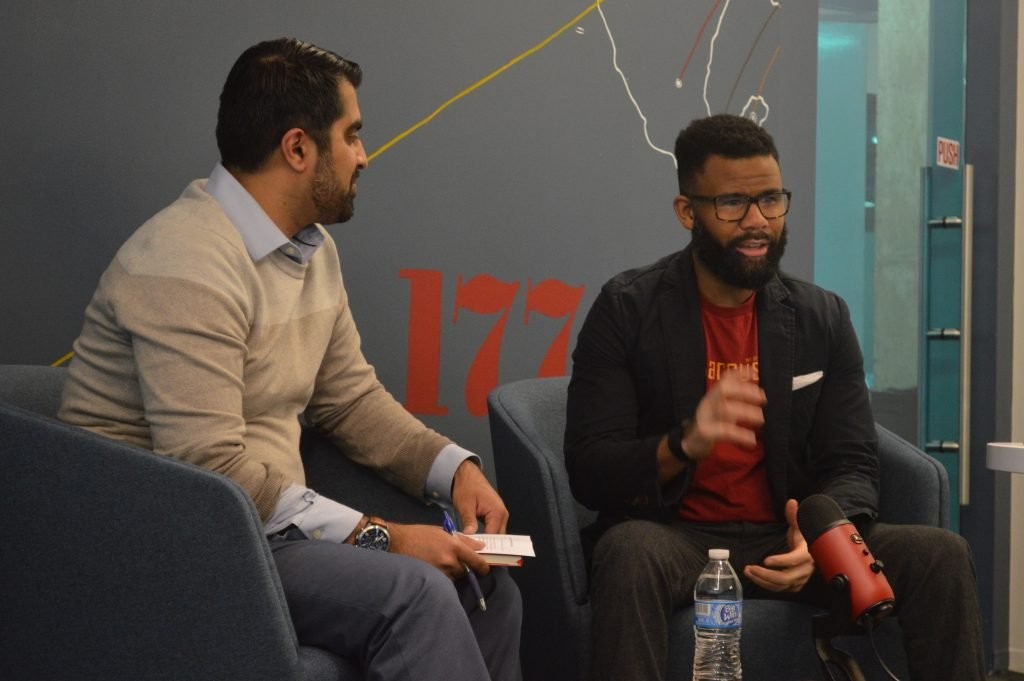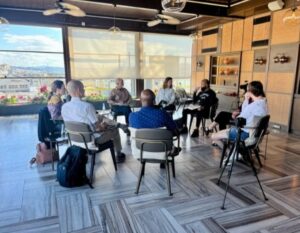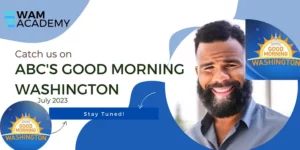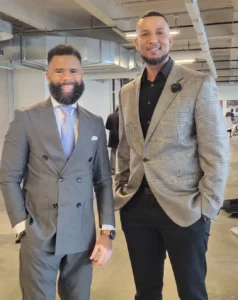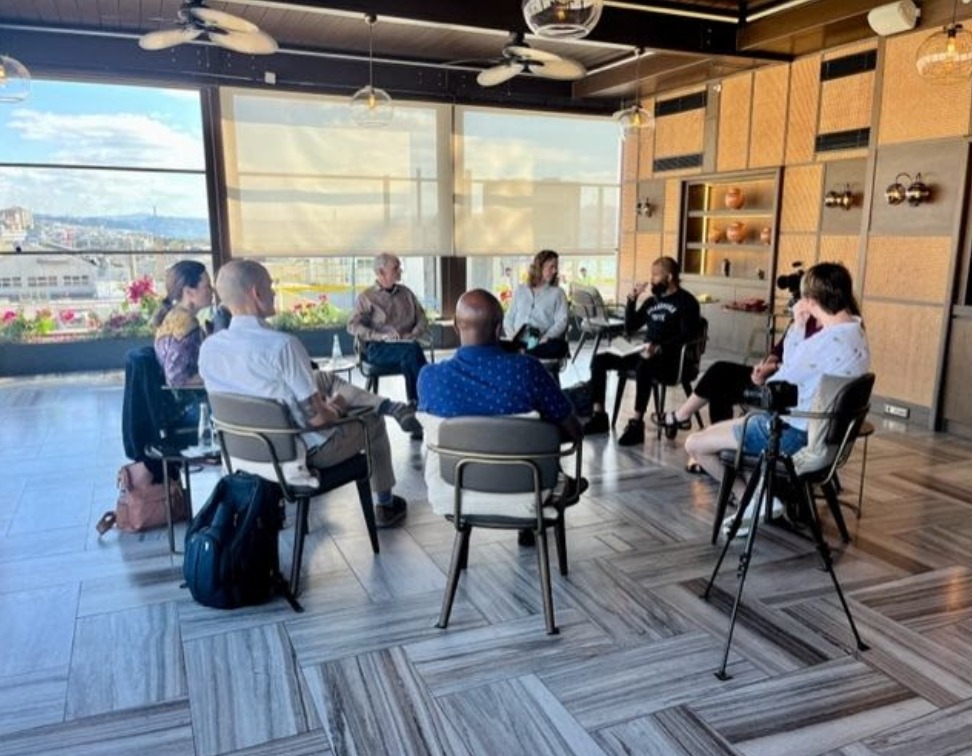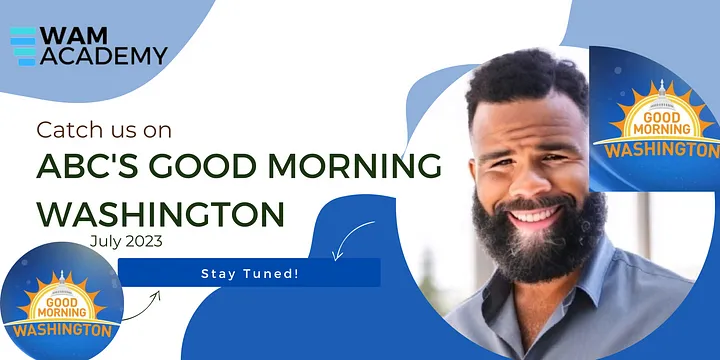Overview:
- We Are Marcus is a character development platform designed to bring mentorship to Black youth and to create mentoring opportunities for Black men across the country.
- Christopher King, the founder and CEO of We Are Marcus, has been featured in Black Enterprise and On the Ryse as a leader in social innovation. He was also recognized by the D.C. Firm Village Capital for Social Impact, and his team recently received an award from the National Institute of Health in recognition of their success as a startup company.
- The platform is a resource that should be urgently considered by school districts because of its incorporation of data and data analytics to track student growth and because of the deeply rooted inequalities within the education system, which are reflected by both the lack of diversity and the wide achievement gaps.
On Wednesday, Fifth Tribe welcomed Christopher King to the 1776 Startup Co-Working Space for the live recording of the fourth episode of the Campfire: Innovation and Impact Podcast. For the second time, the podcast was streamed on Youtube, was recorded in front of an in-person audience, and featured a live question and answer segment.Christopher King is the founder and CEO of We Are Marcus, a character development platform that is designed to bring stories of successful Black men to middle school and high school youth around the country. He and Khuram met at the first 1776 accelerator in D.C.; We Are Marcus was selected out of 150 applicants to take one of ten places in this incubator’s first cohort. The two entrepreneurs share their passion to make an impact, and their hour of conversation jumped from how We Are Marcus bloomed from the intersection of mentorship and technology, to topics related to diversity in tech, and to the role of mentorship in personal and professional development. In a realm that is often considered to be “progressive” and driven towards change, tech companies seem to be struggling with diversity as much as other players; so, in the words of Khuram, “We Are Marcus is coming at the right time.”
Christopher King, CEO of We are Marcus, answers a question from Khuram Zaman, CEO of Fifth Tribe, during the fourth episode of the Campfire: Innovation and Impact Podcast.
What Makes We Are Marcus a Mentorship Game Changer
Although he’s not what one would consider “tech savvy,” Christopher was able to break into the innovation space and bring his vision of We Are Marcus to life because of the “gall and bravery” that drove him; he says that this opportunity is one that he created for himself – one that he did not wait around for -, and that this dedication and focus pushed him to put his ideas down on paper, to make them functional, and to then seek the technology from collaborators. His idea of a mentorship platform sparked in 2015, and the We Are Marcus corporation was launched not long thereafter in 2016.According to the founder, there are two factors that make We Are Marcus a unique and innovative platform that is doing what has not yet been done. Firstly, We Are Marcus brings a cultural sensitivity to mentorship that is lacking in other mentorship experiences. During his discussion with Khuram, Christopher frequently returned to a personal example of an interaction that he had with a school counselor in high school. He was told with directness and without sensitivity – as if the dialogue was neither personalized nor uncommon – that he would never attend a four year university. Looking back with a college degree, two Master’s degrees, and an impressive resume of entrepreneurship, leadership, and social impact projects, Christopher understands that this experience is shared by kids of color everywhere: instead of being uplifted by the school system, they are being defeated and traumatized. Christopher’s motivation is to bring stories that are shared, yet untold, to those who are experiencing what those who came before them did – to show them that, yes, you can overcome. You are strong, talented, and you can (and will!) succeed.We Are Marcus confronts the challenge that typically plagues other mentorship organizations: the mentorship experience cannot be measured. With its incorporation of calculated and evaluated data, AI, and machine learning, the interface can measure how students grow over time after being impacted by the stories shared by their digital mentors. These social and emotional learning frameworks have, for too long, “been locked inside the ivory towers,” Christopher said. But by leveraging data and technology, We Are Marcus is trumping barriers around accessibility, imagination, and social impact. The platform multiplies the ripple of mentorship, and the goal is to cut the mentorship gap (there are currently 16 million missing mentors in this country) in half by 2025.
The Power of the Platform
To Khuram, the concept of a platform was a fascinating one to discuss. He was curious about how his fellow CEO arrived at the idea, and Christopher reflected that his intention was to “bottle up the conversations that [had] been privy with [his] mentor” in order to share them with others. However, he brushed off the prospect of an app: “I didn’t want to be in the app business… everyone has an app.” The logical solution was a platform interface that was accessible via laptop and desktop (though it is mobile friendly). Christopher started with a $2,000 budget and a contracted developer, and the project evolved from the idea that mentor videos and resources could be downloaded onto a desktop so that the user will always see it. Since this original design concept, the We Are Marcus system has continued to be optimized, a constant process that is facilitated by frequent design iterations and rounds of feedback. In terms of functionality, the interface is accessible via a personalized log in. The discussion leader – a teacher, for example – is provided with a facilitator guide, and the students log on to the site to view a gallery of videos ranging from 60 seconds to 2 minutes; these are organized by mentor and message (e.g. personal development, self confidence, etc.) After watching the videos, students respond by either following on-screen prompts or engaging in a “Turn & Talk” activity in which the facilitator leads an active conversation about the message. This immediate opportunity for reaction, response, and dialogue closes the mentor gap “right there in the moment.”
The Struggle for Diversity in the Tech Space… & What Entrepreneurs Can Do About It
After exploring the capabilities and the story behind We Are Marcus, Khuram and Christopher shifted towards a discussion about diversity and technology. Khuram stated that perceptions about the tech community are often that it’s progressive, yet in actuality, it faces just as many challenges with diversity as other industries. He said, “In the AI space, people of color are being failed.” Though the two leaders agreed that it’s a surprising fact in a city as diverse as Washington, D.C., there are problematic realities related to representation in technology. Christopher’s response was subjective and oozed inspiration: “To me, this is very much a matter of taking personal responsibility,” he answered. He looks at these issues as opportunities to resist defeat and complacency and to instead step forward and craft solutions – even if that means asking for help while doing so. Both Khuram and Christopher followed the dialogue that, as entrepreneurs, they do have the capability of having an impact on local communities and bringing these diversity conversations to light, particularly in the tech sphere where leadership roles are dominated by non-people of color. Christopher advocated that the uphill battle of inclusive representation requires people of color in leadership positions – like himself and Khuram – to build spaces that [people of color] are comfortable in and to then open them up to everyone. “Here we come,” Christopher stated. “We are talented… and we have skills that are transferable across sectors.”
Members of the Fifth Tribe team posed for a picture with Christopher King after his talk on mentorship, entrepreneurship, diversity in tech, and making an impact.
Considering We Are Marcus For Your School? Read This:
As the conversation made its way back towards We Are Marcus, Khuram asked Christopher about why a school district should consider signing up for the platform. Christopher gave two primary answers, leading with the fact that We Are Marcus offers data on character development that tracks progress on students that are both high-risk and high achieving. This information contributes to a greater understanding of how students can be better supported and how they can be fed into career and/or education pipelines. Secondly, there is still so much work to be done in terms of the achievement gap. Though the conversation has been going on for years, the progress has only been marginal: “If you’re looking at the numbers for Black and Brown youth, we are not doing enough,” Christopher resolved. In order to overcome challenges associated with disparity and inequity, particularly in the educational sector, there needs to be greater investments into platforms that are positioning themselves as culturally competent and innovative and that prioritize students’ needs and desires. We are Marcus does so, and it also emphasizes the critical role of mentorship and how it can be leveraged to face deeply rooted, systemic inequalities. Interested schools can get involved by requesting a demo on Wearemarcus.com.
Mentorship & Why It Matters
Christopher’s advocacy and passion for mentorship is rooted in his own experience with a mentor. He has witnessed and felt the impact of having a network of people who believe in you more than you believe in yourself; the result is what he calls the “Network Effect” of We Are Marcus. When he was seventeen years old, his own mentor urged him to “stop watching music videos and to start reading the New York Times.” This statement stuck with him, and it projected him forward and motivated him to find his strengths and to constantly and proactively seek new information. Christopher’s relationship with his mentor led him to understand the importance of “paying it forward,” and it was ultimately the inspiration behind his creation of We Are Marcus. His biggest piece of advice in regards to mentorship is to “seek [it] as much as [it] is being made available to you.” Though you can’t receive relevant advice from everyone you meet, it’s important to seek people who share similar passions with you or who are where you want to be; be curious about how they’ve achieved what they have because we can always learn from each other’s experiences.
Who Is Marcus?
The final few minutes of the podcast were dedicated to a question and answer segment with the in-person audience. Perhaps the question that everyone wanted to ask pertained to the origin behind the name “We Are Marcus.” Christopher’s answer was surprisingly simple: “We are” is the movement, the “dynamic of connection” on which the platform is built and that embodies the idea that we are tethered to each other by our shared experiences. The name “Marcus” has ties to Marcus Garvey, a Jamaican-born leader of the Pan-Africanism movement known for his self-determination and civil rights activism. Christopher said that he wanted to name “the mentor and the youth at the same time,” and “Marcus” was the perfect fit. Another question that seemed to be at the forefront of the audience’s mind (including mine) was why We Are Marcus is directed towards Black men and not Black women. Christopher explained that although the content of the platform is gender allusive and that the hope is to eventually migrate towards it being accessible and relevant for all audiences, the position of Black men in our country is particularly critical: in Christopher’s words, the lack of community, family ties, and roles models that is especially prevalent among Black men breeds dire consequences that ripple throughout their entire lives, most notably in the school-to-prison pipeline. In order to disrupt this equation, the priority of We Are Marcus (as of now) is to target young boys of color who lack connection in the school setting.
Advice for Aspiring Entrepreneurs
As the conversation between the two CEOs wrapped up, Khuram asked Christopher about the piece of advice that he would offer someone who is looking to get involved and to build themselves up in the entrepreneur community. His answer was one that makes you want to jump out of bed, climb a mountain, start a business, defy the odds: “Believe in yourself… bet on yourself when no one else will.” It’s inevitable that you will lose and get shot down, but it is our degree of resiliency in the face of these failures that defines us. Someone who knows and puts this idea to action is (or is capable of being) a founder, according to Christopher. “Find your purpose,” he said, “and let it drive you.” Christopher’s purpose, for instance, is making an impact… What’s yours?Campfire is a podcast celebrating impact and innovation in the Washington D.C. Metropolitan Area. Subscribe on Fifth Tribe’s Youtube Channel!
